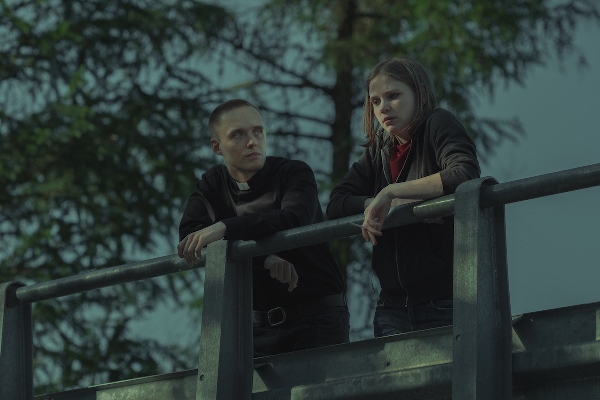

Poland’s 2020 Academy Award nominee for best international film poses complex questions within its relatively simple story of a young ex-con impersonating a priest. Can we ever transcend our sins to attain a state of grace? How pure must we be to lead others on a righteous path? And should religious leaders be free of sin, or is sin part of a shared humanity?
Poland’s Ida won an Oscar in 2015 for raising similar questions of faith, and the films share an atmospheric brooding, depopulated landscape, and a sense of unrighted wrongs. But Jan Komasa’s Corpus Christi takes a harsher, grittier path, flagging the perils of misdirected masculine energy as it follows its troubled antihero on an ultimately tragic journey.
The film opens with lean, scary-looking Daniel (Bartosz Bielenia) narrowly dodging a fight in prison just before his release. The young thug is tough, but leads others in prayer and song in the makeshift chapel—his religion seems heartfelt and deep. He even confides in the prison chaplain that he’d like to enroll in a seminary, but the priest scoffs that his rap sheet makes the goal impossible.
Instead he’ll report to work at a remote sawmill, a dreary prospect at best. After Daniel undergoes a wild night of booze, coke, and sex—Bielenia’s gaunt, bug-eyedface makes the party look like a trip straight to hell—the chance to impersonate a small-town priest suddenly comes up. To his own astonishment, Daniel takes it, and a strange adventure begins.
Daniel’s vague story of religious training in Warsaw seems to pass muster. The town’s cynical, burnt-out vicar retreats on medical leave (possibly a detox), so Daniel begins to take over confession and masses. The village’s weary townspeople are intrigued by the young novice’s modesty, his quiet charisma, and his frank admissions of doubt, depression, and wrongdoing.
Soon he tries to leverage his standing to heal the fallout from a fatal car accident that has divided the town—he has help from a teenage girl (Eliza Rycembel) who wants to see justice done—but he becomes ensnared in local secrets, corruption and cover-ups. The town’s mayor warns him to stop rocking the boat, and a figure from his past resurfaces to menace his new status and new mission. Can Daniel handle these threats and be the upstanding man God calls him to be? Although his identity is false, can he still serve the community? More urgent temptations of the young-man type lie in wait, too.
The movie serves as a sort of backhanded valentine to youth: to the young’s dissatisfaction with the status quo, their capacity for reinventing themselves, and their desire to be swept up in a great cause. At the same time, it cautions against overreach and deception. The film evokes Daniel’s faith with focused, tight camerawork that communicates power and transcendence. You can evaluate faith all you want, the film seems to say, but you can’t resist its strength. Equally strong beneath the film’s surface is the pull of violence that brings Daniel back to a place even worse than where he started.
Dry humor and committed performances elevate Corpus Christi far above a sermon, but there is no escaping the film’s probing questions and the dark places they lead.






Leave A Comment